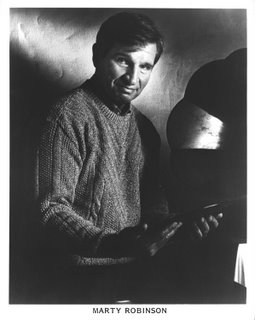
Marty Robinson refuses to sue me. Even though in my memoir I labeled his dad a bookie, the legendary voice of Chicago radio and TV insists on being a mensch, thus robbing me of a controversy that might have spurred headlines and boosted book sales.
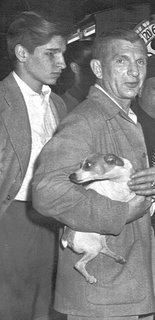
Here’s the edited passage from "The Division Street Princess" where we first meet Marty’s dad, Emmanuel “Coffee” Robinson (All photos in this post are identified at the end.):
“I don’t know if Irv can handle the store alone,” my mother said.
“It’s not the store you’re worried about,” Aunt Mollie said. “Irv will behave himself. He knows you mean business.”
“What about Coffee and Major?” my mother said.
“I thought you told me that dreck was finished.”
“Yeh, the police closed them down and Irv promised no more. But who knows, maybe with me out of town, they’ll be back.”
I knew what Mom was talking about, and for a moment, my mind wandered from the Elkin sisters at the kitchen table to a pleasant memory of Coffee and Major, the neighborhood bookies who often visited us in the kitchen in the rear of our grocery store.”

According to Marty, his dad – my Coffee -- “was not a bookie, but a junk peddler by trade, a gin player and a fisherman by choice, and an occasional overseer of the card games at Humboldt Billiards.” Marty does allow that perhaps an episode in my book was his dad’s “effort to get into the field.”
Here’s what I wrote:
“I also knew why Mom was worried about Dad and the bookies, for I had learned details just the week before when my parents’ loud voices awakened me from sleep.
“A hundred bucks a week,” my dad had said. “We can’t throw that away.” I heard the click of glass, likely an ashtray, then smelled cigarette smoke, and knew my dad would be lighting up one of several Camels.
“I don’t care what he gives you. I don’t want a bookie joint in the back of my store,” Mother had said. “Even if it’s after we close up.” She was moving around the kitchen, the sound of her wedge house slippers mingling with the swish-swish of a broom across the linoleum.

A bookie joint! I projected a scene straight out of the movies: Jimmy Cagney-types in wide-shouldered suits and dark fedoras, banks of ringing telephones, cigar smoke, stacks of cash.
“Whadaya worried about?” my father had said, interrupting the film I was directing.
“The police, like the last time.” My mother’s voice had risen as the sweeps came faster and louder.
Police! There were police in our store! I leapt from my bed and opened the bedroom door several inches wider, anxious not to miss a word.
“That was bupkis,” Dad had said laughing. “Major paid off the cops like always, but some schmuck thought he’d make detective if he blew the whistle.”
Major’s family has weighed in about his depiction in my book, too. Janice Lipinski, his niece, remembers her uncle, Irving “Major” Kasoff, as a masseur at the schvitz on North and Damen. She claims ignorance of the pair’s shady sideline, but admits “Major hung out at the poolroom on Division Street and always knew somebody who could get you a deal on anything.”

Marty says he can speak to Major's expertise as a masseur: (Imagine Marty’s melodious voice reading you this part.) “He was much in demand at the schvitz. When he used that broom made of oak leaves and dipped in hot suds on your flesh, the glow lasted the rest of the day. The soap was rinsed off with buckets of hot water, and then custom demanded you jump into the plunge pool. The water temperature was about 60° but it felt like 32. Then it was back into the steam room. I never made it to the top (hottest) shelf.”
I think the reason Marty and Janice refuse to press charges – sending me fan letters instead of litigation – is that even if their relatives did dip their hands in the trade, bookmaking back in the 1940’s seemed to be more colorful than criminal, folklore rather than felonious. No matter. Coffee and Major remain in my memory as treasured characters who only added fun and sweetness to my Division Street childhood. Never anything scary, like other incidents back then.
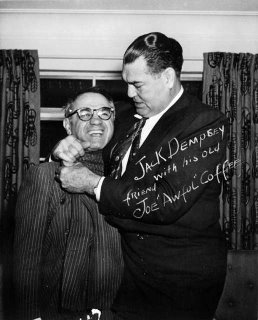
If you’re wondering where the duo’s Runyonesque nicknames came from, Marty explains his dad’s tag this way: “During the depression, my father, like many others, rode the rails as a hobo. One night at a hobo camp, he was asked his name by a big fellow with band intent. My dad bore a striking resemblance to a boxer of that era named Awful Joe Coffee. That’s who he said he was, and no one challenged him after that. The name Coffee stuck.”
As for Major – who remained friends with Coffee until their deaths (Coffee in 1970 at the age of 64, and Major in 1976 at 68) -- neither Janice nor Marty know where that nickname came from. Perhaps it was simply because Major was a big guy who commanded respect.
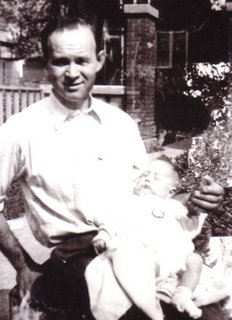
Of course, bookies weren’t the only crafty hustlers of the era. Junkmen, like Marty’s dad, and peddlers, like my uncle Jack Silver, also added zest to Division Street and to other old neighborhoods. Immigrants saw these jobs as footholds to a better life for their families, and they schlepped from pushcarts to horse and buggy, to trucks, and some even to enterprises that grew into department stores or major businesses.
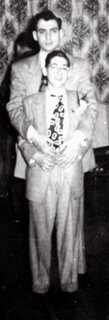
My brother, Ron, recalls Maxwell Street -- Chicago’s most famous gathering spot for immigrant peddlers – in this passage he contributed to today’s post. He says between the ages of 12 and 15 (1947-50), “ Dad and I used to go to Maxwell St. on Sundays, meet with the market master or whatever he was called and he would give us a spot and merchandise to sell. We had a minimum price and anything over that was ours. We sold all kinds of stuff, from softballs, watches, leather jackets, cashmere sweaters, etc. I learned more things about selling on those Sundays that stay with me today. You never lost a sale because of price. We had so much fun that the hours on our feet didn't matter, we were together and were a great team. I kept Dad in stitches with my carnie routine even back then. Good memories.”
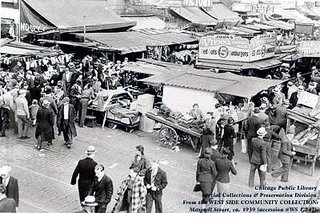
You can learn more about Maxwell Street, which was sadly dismembered in 1994 and later sterilely resurrected by the city of Chicago, by going to the excellent website established by the Maxwell Street Foundation and by reading “Jewish Maxwell Street Stories” by Shuli Eshel and Roger Schatz. Both visits will return you to the world famous bazaar of my childhood that gave generations of Chicagoans long lasting memories.
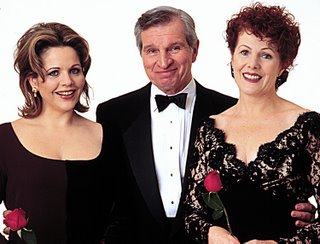
As for Coffee’s son, he’s been active in the communications industry since 1956 when he was on the air at WEAW in Evanston, then WAAF in Chicago, and of course, his long career as the preeminent voice at WTTW-TV (1971-1998), host of the annual Golden Apple Awards and Chicago Jazz Festival broadcasts, and producer and host of “The First Fifty Years” (1967-1992). He’s been a sought-after media consultant and trainer for Fortune 500 companies, government agencies, politicians, major league sports franchises, and more.
I imagine that Coffee, my former neighborhood bookie – oops, junk peddler – would be enormously proud of Marty. I can see him and Major, somewhere in the cushy Division Street afterlife, kvelling over his talented tenderhearted kid.
Photo Captions:
1. Marty Robinson in a photo taken by the late Sherwood Fohrman.
2. Marty, age 13, with his dad Coffee and their toy fox terrier, Midge. Circa 1945.
3. Coffee and Major, sometime in the ‘50s.
4. Photo of a book making operation. This is what I imagined our bookie joint to look like.
5. Photo, taken perhaps in the back room of Humboldt Billiards with Coffee in the back row center in the dark coat.
6. Jack Dempsey poses with Joe "Awful" Coffee, probably in Colorado. Joe was a successful boxer in his younger years, and then became the owner of the Ringside Lounge, a well-known Denver restaurant from 1942-1965. He was active throughout his life and honored for helping the handicapped, mentally impaired and orphaned.
7. Jack Silver, a fruit peddler in the 1940s, whom I describe as a shtarker in my memoir. The baby in his arms is one of his three children, but my cousins are at a loss as to which one of them it is.
8. The Maxwell Street of our childhood.
9. My brother, Ron Shapiro at his bar mitzvah with my uncle Hy Elkin. Perhaps Ron’s suit was purchased on Maxwell Street where he would’ve been dragged into a store by one of the street’s infamous “pullers.”
10. Marty Robinson with Renee Fleming and Lynne Redgrave in 1999 at Orchestra Hall during the taping of the PBS special "Star-crossed Lovers."
Upcoming:
October 27, 2006

No comments:
Post a Comment